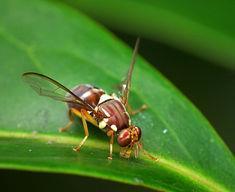
British Summer Fruits has moved to calm fears that a pest new to the UK could cause millions of pounds worth of damage to almost every domestic fruit crop.
National press reports following the discovery of Spotted Wing Drosophila (SWD) at East Malling Research (EMR) last month suggested that the pest could “decimate” the UK industry as it had some growers’ crops in the US, by attacking berries, pears, cherries, plums and even grapes and tomatoes. Apples are the one crop thought to be safe from the new pest.
However, Nick Marston, speaking on behalf of British Summer Fruits (BSF), said: “That is somewhat alarmist. If you allow any pest to go out of control then it will lead to high levels of loss on individual farms. However, this is not a completely new pest. It originated in Asia and has spread over a number of years to almost all fruit-producing areas of the world.
“When it first appeared in the US four or five years ago, it caused significant commercial damage. But our understanding on how to treat and control it is much greater now and it is eminently controllable.”
The fly has been in Spain and other parts of mainland Europe for two to three seasons and it is “almost certain” it arrived in the UK on imported fruit, BSF said.
“The key thing is that growers monitor for it,” said Marston. “It can be controlled through mass trapping and through good field hygiene by removing rotting and damaged fruit. There is also a range of insecticide treatments that growers can use if needed, although they are reluctant to do that as they do not want to upset their biological controls for other pests.”
EMR is working with the Horticultural Development Company (HDC) to look at all the available options from around the world to control the pest, including biological controls for the future.
Marston said: “The arrival of SWD in the UK was an inevitability and it is not a notifiable or controlled pest as the view of Fera is that it would inevitably arrive in this country and cannot be eradicated completely.
“SWD is a serious pest, but it is one that can be controlled and EMR and the HDC have been working on this for the past three years. There is absolutely no need for customers or consumers to be alarmed. Spotted Wing Drosophila does not pose any food safety risk or any risk to consumers’ health.”



